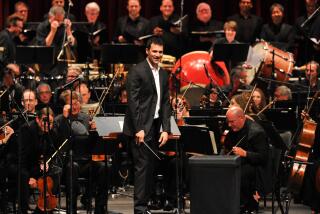Proposal May Quell Free Online Music
- Share via
Federal arbitrators on Wednesday proposed royalty rates for Internet radio services that could spell trouble for Webcasters--with some predicting doom for many free online music channels.
The fees, which amount to fractions of a penny per song per listener, are higher than what Webcasters had proposed. Yet they’re also significantly lower than what record labels had sought.
“I think that a lot of people are going to look at this and say, ‘Yeah, that’s it, we’re done,’” one online radio executive said.
The panel’s proposal will be reviewed by officials at the Library of Congress, which formally sets the rates. That decision, expected this spring, will cover any music played by a non-interactive online music service since October 1998.
The Internet spawned an explosion of free radio services supported by advertising, including Web-only outlets such as Live365.com and simulcasts of over-the-air stations. A 1995 law required online stations eventually to pay royalties not just to songwriters--as over-the-air stations do--but also record companies.
Critics of the rate structure fear listeners who want free radio online will be left with only a few deep-pocketed media giants willing to absorb Internet losses.
The arbitration panel proposed lower fees for noncommercial broadcasters and for radio stations that simulcast their over-the-air broadcasts on the Web. But even those lower fees struck some broadcasters as too high at a time of feeble advertising revenue.
“I just don’t know how we could have been any more clear about how expensive and about how little to no money we’ve been making in this area,” said Dan Halyburton, a senior vice president at Susquehanna Radio Corp. of York, Pa. With these rates and extensive new reporting requirements for online broadcasters, Halyburton said, “you just may have witnessed the end of commercial streaming on the Internet.”
Officials at the Recording Industry Assn. of America countered that it’s only fair for Webcasters that build their businesses around music to pay the people responsible for it. Half of the royalties collected go straight to artists, the rest to their record companies.
“It is apparent to us, as it was to the [arbitration] panel, that Webcasters and broadcasters of every size will be able to afford these rates and build businesses on the Internet,” RIAA President Hilary Rosen said in a statement.
The total amount of money involved is hard to gauge, but insiders estimate the initial payment of back royalties would total several million dollars.
The panel’s proposal would require over-the-air stations to pay 70 cents or more per hour for every 100 listeners online, depending on how many songs they played.
An Internet-only broadcaster would pay twice as much, and noncommercial stations that aren’t subsidized by the Corporation for Public Broadcasting would pay less.
Tuhin Roy, an independent digital media consultant and general counsel for online broadcaster Echo Networks Inc., said, “The fact that companies will be liable for royalties before they’ve had an opportunity to develop an audience, and therefore revenue, is going to act as a deterrent to new companies coming into this space.”
Sean Ryan, president and chief executive of online broadcaster Listen.com, agreed: “It just makes a free radio offering simply more difficult in an environment that’s already staggeringly difficult.”
Listen offers a combination of free radio and subscription-based music on demand, with a subscription radio service on the way. The company isn’t likely to make any major shifts in its approach, Ryan said, but the royalties could affect how much emphasis it puts on the free service.
Halyburton predicted that the only companies able to afford the proposed rates were Yahoo Inc., AOL Time Warner Inc.’s America Online and Microsoft Corp.’s MSN Internet service.
“If you don’t like the idea of all of the product offerings being offered in just three places, you don’t like what happened today,” he said.
More to Read
The biggest entertainment stories
Get our big stories about Hollywood, film, television, music, arts, culture and more right in your inbox as soon as they publish.
You may occasionally receive promotional content from the Los Angeles Times.











